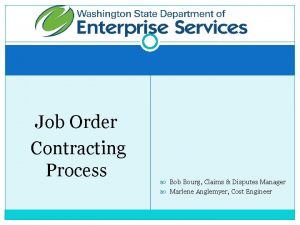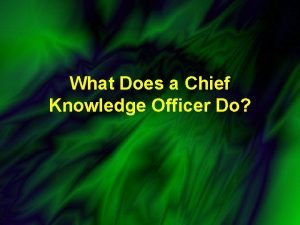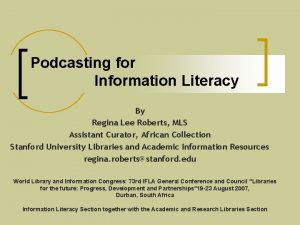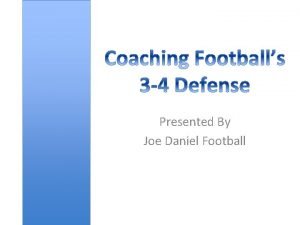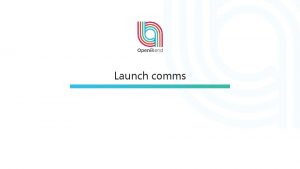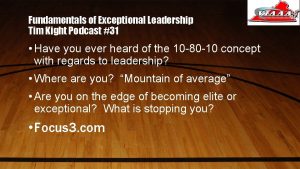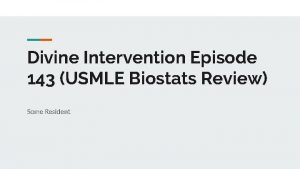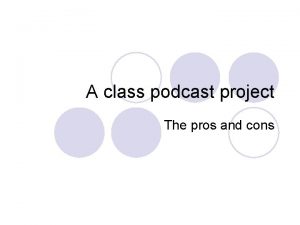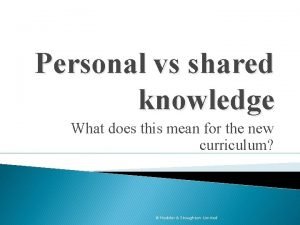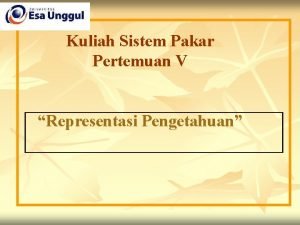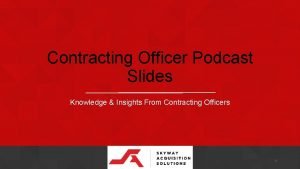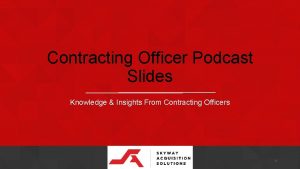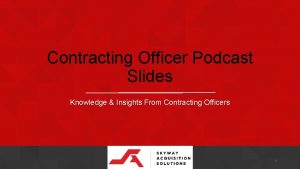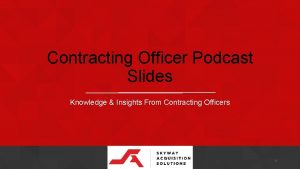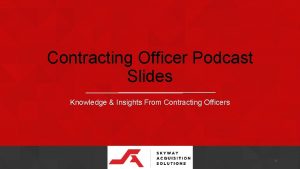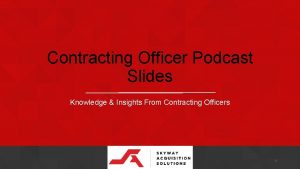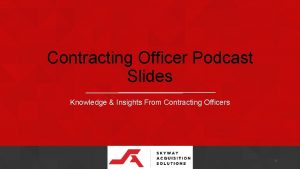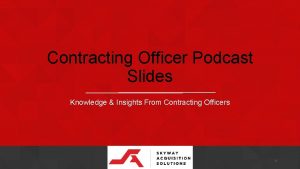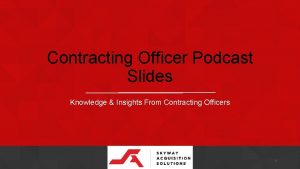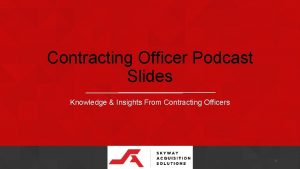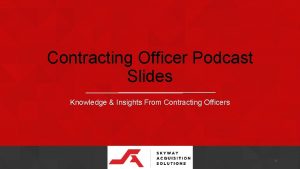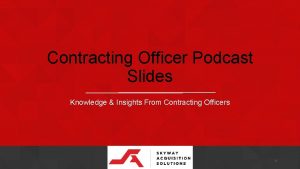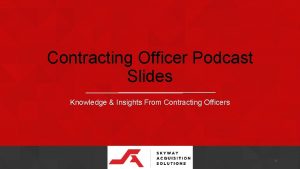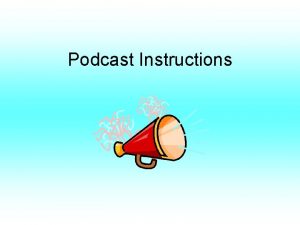Contracting Officer Podcast Slides Knowledge Insights From Contracting
















- Slides: 16

Contracting Officer Podcast Slides Knowledge & Insights From Contracting Officers 1

Episode 012 What is the Requirement Zone (Zone 1) Original Air Date: February 1, 2015 Hosts: Kevin Jans & Paul Schauer 2

Formatting notes • Hyperlinks: Blue font indicates hyperlinks – presentation must be in ‘Slide Show’ mode to activate the link • Red bold font indicates a point of emphasis • Green bold font indicates CO’s personal comment or perspective 3

When does the Requirements Zone happen? • Acquisition Time Zones (from Podcast Episode 003) • Execution Time Zones (from Podcast Episode 084) • Requirements Zone • Kick Off Zone • Market Research Zone • Performance Zone • RFP Zone (proposal zone) • Re-compete Zone (well, sort of… ) • Source Selection Zone • Wrap-up Zone 4

What is the Requirements Zone (Zone 1)? • Developing, defining, and describing what Government intends to procure • The requirement is the WHAT, the acquisition strategy is the HOW • Customer tasks: • Prepare the Needs Statement and establish performance specifications • Request funding • Coordinate with the Contracting Officer to conduct Market Research (Zone 2) and prepare the RFP (Zone 3) 5

What is the Government Team Doing? • Process of identifying and defining exactly what the Government customer needs • Customer drafts the specification, or updates the spec from last procurement • CO writes the following: • Source Selection Plan • Acquisition Strategy • Contract requirements 6

What is Industry Doing? • Performing on existing contracts • Attempting to win other new contracts • Communicating with the user community about potential requirements (like this one) • Anticipating Government needs and developing solutions 7

FAR Part 7 – Acquisition Planning • FAR 7. 102(b) – Planning uses input from all personnel responsible for significant aspects of the acquisition • Purpose is to ensure that Government meets its needs in the most effective, economical, and timely manner • NOTE: It helps to have the Agency’s attention (by targeting effectively) • Agencies with detailed acquisition planning system that generally meets the requirements of FAR 7. 104 and 7. 105 need not revise their system to meet those requirements 8

Myths and Realities • Misconception: Agencies generally have already determined their Requirements and acquisition approach • Industry has limited impact during the pre-RFP phase • Reality: Early and specific industry input is valuable • Agencies generally spend a great deal of effort collecting and analyzing information about capabilities within the marketplace • The more specific you can be about what works, what does not work, and how it can be improved, the better 9

Industry Input in the Pre-RFP Phase • Agencies appreciate industry’s valuable input into their acquisition strategies and solicitation packages because it may result in a better solution to their requirements • Simply providing suggestions and comments prior to formal requirements development will not trigger an organizational conflict of interest • As long as the vendor is not then hired to develop the requirements • Suggesting detailed solutions to your concerns is even more valuable. 10

Industry Input in the Pre-RFP Phase • Agencies may issue a Request for Information (RFI)… • As part of market research to investigate the industry and marketplace in accordance with FAR Part 10 -- Market Research • To determine if commercial items are available • To determine if small businesses are capable of meeting the agency’s needs • For many other planning purposes 11

Industry Input in the Pre-RFP Phase • Agencies may also… • Issue a draft RFP to obtain comments and suggestions from potential vendors on how to improve the solicitation • Hold pre-solicitation or pre-proposal conferences or webinars • Post wikis to explain requirements, RFP process, and evaluation factors • These engagement opportunities allow for vendor questions and feedback • Take advantage of every opportunity to provide targeted suggestions 12

Additional FAR Guidance • FAR 15. 201 – Exchanges with Industry Before Receipt of Proposals • Encourages exchanges with all interested parties, beginning at the earliest identification of a requirement through receipt of proposals • After RFP release, the CO is focal point of any communications with Government • To ensure a fair competition is conducted • Many times, a Q&A period is included in the acquisition process, allowing time for potential offerors to review the solicitation and submit questions 13

Additional FAR Guidance • Even without a Q&A period, industry is still encouraged to ask the CO questions (in a timely manner) to ensure full comprehension of the RFP • COs generally prefer questions via e-mail • They can ensure they understand the question • They can facilitate obtaining an answer • Should the CO decide to make any changes to the solicitation, it will be done via an amendment to the solicitation and posted for public viewing 14

Summary • It is valuable for industry to provide information to Government early in the procurement cycle • Information on better solutions already available in the marketplace • May achieve significant cost savings • Be specific and clear in your feedback • RFIs, Draft RFPs and Pre-proposal Conferences all shape the Requirement and can happen in Zones 1, 2 or 3 15

Contact us • We are on Linked. In, Twitter and Facebook • We also started the Government Contracting Network Group on Facebook. Join us there! • Send your topics to paul@Contractingofficerpodcast. com • For Community support, contact Shelley Hall at shelley. hall@skywayacquisition. com 16
 Contracting officer podcast
Contracting officer podcast Chief contracting officer
Chief contracting officer A small child slides down the four frictionless slides
A small child slides down the four frictionless slides Robert pushes the box to the left
Robert pushes the box to the left Chief knowledge officer job description
Chief knowledge officer job description M audio podcast factory
M audio podcast factory Joe daniel football
Joe daniel football Podcast hr2 funkkolleg psychologie
Podcast hr2 funkkolleg psychologie Launch comms
Launch comms Tim kight podcast
Tim kight podcast Divine intervention usmle
Divine intervention usmle Podcast project class 12
Podcast project class 12 Felels
Felels Storyboard for podcast
Storyboard for podcast Shared knowledge vs personal knowledge
Shared knowledge vs personal knowledge Contoh shallow knowledge dan deep knowledge
Contoh shallow knowledge dan deep knowledge Gertler econ
Gertler econ
